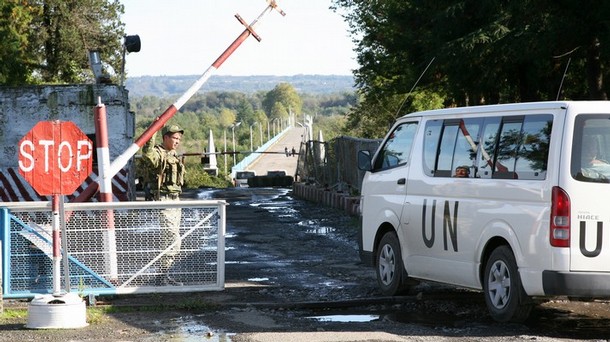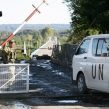
UNOMIG, RIP: the Curtain Finally Falls on a Side-Show
Publication: Eurasia Daily Monitor Volume: 6 Issue: 116
By:

On June 16 U.N. Secretary-General Ban Ki-moon saw himself compelled to order the United Nations Observer Mission in Georgia (UNOMIG) to cease operations immediately, after 16 years of existence (Secretary-General’s office press release, June 16). That same day (late on July 15 New York time) in the U.N. Security Council, Russia had just vetoed a Western-initiated resolution to renew UNOMIG’s mandate.
UNOMIG ended its existence in the same way it had begun 16 years ago: as a somewhat farcical side-show to the larger farce that had been Russia’s "peacekeeping" operation in Abkhazia, Georgia. With Russia turning overtly from "peacekeeper" into invader and occupier after August 2008, UNOMIG’s days were numbered and have now come to a close.
The Mission’s implicit goal, generally accepted at least in theory, was to provide some measure of international scrutiny on the Russian "peacekeeping" operation. UNOMIG was conceived as a minor accompaniment to Russia’s "peacekeeping," a mere semblance of an international presence on the ground.
UNOMIG’s declared goals included the creation of conditions for the return of Georgian internally displaced persons to their homes in Abkhazia, facilitating contacts across the demarcation line, promoting respect for human rights, and assisting in the maintenance of public order as its collateral tasks. In practice, the Mission did engage in some useful social-work-type activities. But, with its limited resources and even more restricted political leash, UNOMIG failed to check, let alone rein in, Russia’s abuse of "peacekeeping" and its militarization of Abkhazia throughout this period.
Failure was built into this U.N. Mission from the outset. Its political mandate, numerical size, equipment, and funding were all subject directly or indirectly to Russian veto in the U.N. Security Council and other structures. UNOMIG was only authorized to field approximately 150 observers in recent years (some 130 military officers and approximately 20 policemen as of 2008-2009), all unarmed. Outnumbered by up to fifteen times the number of Russian troops even before the August 2008 invasion, UNOMIG fully depended on Russia’s "peacekeeping" troops for the Mission’s own safety, and its mobility during its 16-year existence. Thus UNOMIG did not enjoy the necessary independence from the main object of its monitoring.
Although acting on U.N. recognized Georgian sovereign territory, UNOMIG was deprived of any intelligence-collection capability at Russian insistence. Throughout these years the Mission could not report in a full and timely manner on Russian activities that undermined local stability, militarized Abkhazia, or threatened the Georgian state as such. Some of these activities were clearly visible, but UNOMIG had to close their eyes; presumably for political reasons dictated from U.N. headquarters. Such was the case when Russian forces air-bombed and shelled the upper Kodori gorge in 2006-2007.
Russian military columns poured into Abkhazia, Georgia from April to June 2008, with obvious offensive intent, while UNOMIG could only catch glimpses of the movements and its political superiors in New York failed to sound the alarm. When Russian forces moved unprovoked to attack Georgia from Abkhazia on August 9, they gave UNOMIG two hours’ notice to leave the area. UNOMIG cleared out immediately and understandably: the observers were defenseless and could not be expected to risk their lives.
UNOMIG’s mandate was subject to routine prolongation by U.N. Security Council resolutions at six-month intervals during all these years. Russia exploited this procedure to extract a semblance of international legitimacy for its own "peacekeeping" operation. Under implicit threats to veto UNOMIG’s prolongation, Moscow introduced expressions of praise for Russian "peacekeeping" in the Security Council’s resolutions in recent years. Western countries could have resisted but played along, on the logic that UNOMIG’s presence -even as a minor accompaniment to the Russian operation- was better than no international presence at all.
Thus the U.N. Security Council routinely praised every six months a "peacekeeping" operation that did not meet any of the U.N.’s own standards for peacekeeping. Year after year, Moscow quoted those U.N. accolades as an argument to reject Georgia’s calls for internationalization of the Russian "peacekeeping." When Georgia considered exercising its sovereign right to demand the withdrawal of those troops, top U.N. authorities as well as Western governments warned that UNOMIG would also withdraw in that case, its mandate and presence being linked with the Russian operation. On the logic that "even UNOMIG is better than nothing at all," Georgia was pressured into retracting that demand on several occasions in recent years. The alternative would have been to face Russia across the Inguri River one-on-one.
Russia’s occupation and "recognition" of Abkhazia (and South Ossetia) has marked the termination of Russian "peacekeeping," and consequently of UNOMIG’s mandate, in Moscow’s view. Russia is also poised to kill the OSCE’s field presence in South Ossetia through using its veto at the OSCE. Commenting on the veto in the U.N. Security Council, Russia’s U.N. permanent representative Vitaly Churkin said, "There is no sense in prolonging it [the UNOMIG’s mandate] because it is based on the old realities," ignoring the "new political and legal conditions" (Interfax, June 17) -that is, the spoils of Russia’s August war.




